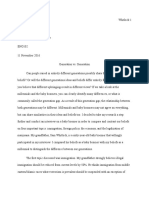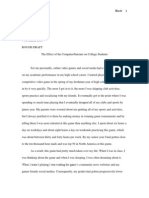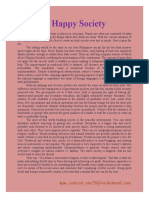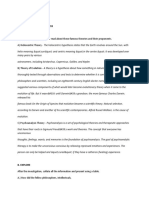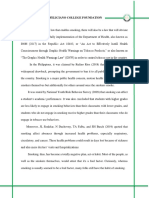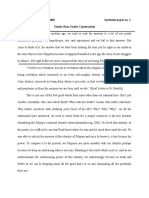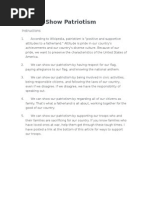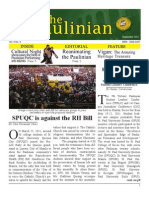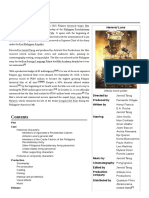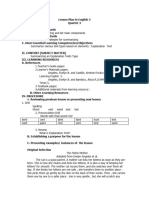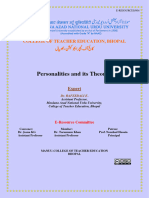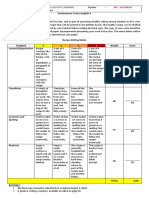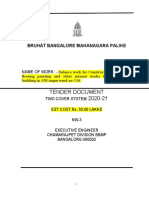0 ratings0% found this document useful (0 votes)
65 viewsManlapaz - NATIONALISM VS. PATRIOTISM Essay
Manlapaz - NATIONALISM VS. PATRIOTISM Essay
Uploaded by
Glenn C. Batincila Jr.1. Nationalism is the ideology where the state or nation is prioritized above all else and citizens are expected to be united under one identity. It believes the nation should come before anything.
2. Patriotism is a vaguer concept focused on love and devotion for one's country. It is having affection for one's country without requiring superiority over others.
3. The key difference is that nationalism requires superiority of one's nation over others, sometimes leading to conflict, while patriotism involves loving one's country without making judgments of other countries. Both ideologies can have positive or negative impacts on a nation depending on how they are expressed.
Copyright:
© All Rights Reserved
Available Formats
Download as PDF, TXT or read online from Scribd
Manlapaz - NATIONALISM VS. PATRIOTISM Essay
Manlapaz - NATIONALISM VS. PATRIOTISM Essay
Uploaded by
Glenn C. Batincila Jr.0 ratings0% found this document useful (0 votes)
65 views4 pages1. Nationalism is the ideology where the state or nation is prioritized above all else and citizens are expected to be united under one identity. It believes the nation should come before anything.
2. Patriotism is a vaguer concept focused on love and devotion for one's country. It is having affection for one's country without requiring superiority over others.
3. The key difference is that nationalism requires superiority of one's nation over others, sometimes leading to conflict, while patriotism involves loving one's country without making judgments of other countries. Both ideologies can have positive or negative impacts on a nation depending on how they are expressed.
Original Title
Manlapaz_NATIONALISM-VS.-PATRIOTISM-Essay
Copyright
© © All Rights Reserved
Available Formats
PDF, TXT or read online from Scribd
Share this document
Did you find this document useful?
Is this content inappropriate?
1. Nationalism is the ideology where the state or nation is prioritized above all else and citizens are expected to be united under one identity. It believes the nation should come before anything.
2. Patriotism is a vaguer concept focused on love and devotion for one's country. It is having affection for one's country without requiring superiority over others.
3. The key difference is that nationalism requires superiority of one's nation over others, sometimes leading to conflict, while patriotism involves loving one's country without making judgments of other countries. Both ideologies can have positive or negative impacts on a nation depending on how they are expressed.
Copyright:
© All Rights Reserved
Available Formats
Download as PDF, TXT or read online from Scribd
Download as pdf or txt
0 ratings0% found this document useful (0 votes)
65 views4 pagesManlapaz - NATIONALISM VS. PATRIOTISM Essay
Manlapaz - NATIONALISM VS. PATRIOTISM Essay
Uploaded by
Glenn C. Batincila Jr.1. Nationalism is the ideology where the state or nation is prioritized above all else and citizens are expected to be united under one identity. It believes the nation should come before anything.
2. Patriotism is a vaguer concept focused on love and devotion for one's country. It is having affection for one's country without requiring superiority over others.
3. The key difference is that nationalism requires superiority of one's nation over others, sometimes leading to conflict, while patriotism involves loving one's country without making judgments of other countries. Both ideologies can have positive or negative impacts on a nation depending on how they are expressed.
Copyright:
© All Rights Reserved
Available Formats
Download as PDF, TXT or read online from Scribd
Download as pdf or txt
You are on page 1of 4
Mary Dorothy S.
Manlapaz
BS - Entrepreneurship
GEC105, W23
NATIONALISM VS. PATRIOTISM
If you come from a typical or a regular citizen ‘s perspective,
nationalism could be defined simply as the love for country. However,
nationalism in much complicated terms is the ideology wherein a state or a
certain country must be in unison. It is where everyone living in the same
nation must be united and coordinating as one state. It is a movement that
upholds the citizens that should be in constant agreement with the nation.
In lay-man’s terms, nationalism is the loyalty and dedication to a particular
nation. It is the situation in which the nation comes first or is primarily
considered before anything else. The country above anything else. To
further explain, imagine falling in love at the age of 26 and starting a
family at the age of 29. Once you have a household to provide for and
mouths to feed on a daily basis, normally it could come to a point where
everything you can think of is how to do this. To simply put this in context,
your family comes first in every situation. Nationalism is like that of the
same scenario given where instead of a family, the country comes first.
This system first originated in the 18th century as a known method to
determine,distinguish and promote a state depending upon their
anthropological principles. It utilizes the political, economic, and cultural
aspects of the nation to nurture the welfare and authoritative power of a
state among everything else.
Patriotism on the other hand is a much more vague political
ideology than nationalism. It mainly focuses on the love and devotion for a
certain country. It is the feeling of being attached to your country or a
political movement or community. If you ask a certain regular person
working a 8-10 hour shift, patriotism would be defined simply as the
passion and a great sense of adoration for a certain country, movement, or
political views. It is the extreme desire to love the country and serve it in
all conditions. This ideology is deep rooted in the heart of a man who is
willing to sacrifice his own precious life for the sake of serving his nation.
He or she can easily and willingly sacrifice his life for the land of his birth.
This love is not the typical love one would feel for another person. It
means much more than that. It is a one a kind admiration for a country
that is untouchable and unchangeable. In other words, it will forever
remain that way even to the last second of his/her breath. Just like
nationalism, patriotism is a powerful force that drives the people in certain
areas that will most likely make them prosper or the other way around.
Most groups would say that nationalism and patriotism are
completely the same thing. However, apologies for bursting this bubble but
this is far from the truth. There are people who are claiming to be
“patriots” but they are in fact nationalists or the other way around. To
further elaborate, what exactly is the difference between patriotism and
nationalism? Let us go back to the basic definition of patriotism which is
love for one’s country. Generally, anyone who loves their country is
considered a patriot. However, in the context of nationalism, it’s not about
it’s other definition which is the desire for a certain region to be
independent or stand alone but its similar definition with patriotism. These
ideologies can be both defined as the love and adoration for one’s country
but this is where their similarities come to an end.
Unlike patriotism, nationalism is the love for one’s country at the expense
of other countries. Countries who are extremely nationalistic are the ones
who often result to war with other countries in the strong belief of inferiority
over the other. It cannot be denied that throughout the entire timeline of
our history, millions or billions of people have died due to war. Come to
think of it, were all of those casualties because of nationalism? Probably
not but the ideology alone is enough to be considered frightening. How
would our present day be, if all the countries strongly believed in
nationalism? To further explain, nationalism is the deep rooted devotion of
a person for his/her country and believing that it is the only superior thing
in the world. In patriotism, it is basically still the love for a country but only
for the reason that he or she is a citizen of that particular country. Their
difference can be easily distinguished once you finally get to understand it.
Patriotism focuses more on the moral values and beliefs of a country while
nationalism is more reliant on the cultural similarities and language to and
to their heritage. It’s actually similar to how generation z and millennials
are supporting their favorite korean artists. One supports a group and
loves this certain group because of their songs and visuals. While the
other does the same but engages in fan wars to prove that this particular
group is the best group to ever exist and does all the things just to
degrade the other groups. Patriotism is being symbolized in the first
example while nationalism is the second example.
Both of these ideologies have deliberately affected a nation’s social,
political, and cultural movements. In the context of social influences,
nationalism in general has affected the social communities around the
world. Patriotism initiates individuals to follow a specific strategy, mission,
and improvement proposition, regardless of whether they have an
irreconcilable situation. Enthusiasm empowers building social agreement
among the general population, hence aiding society's turn of events and
progress.
As numerous feature writers, instructors and officials have it, the
shortfall of loaded with life patriotism is at the premise of a wide range of
issues, thus, throughout the long term, the expression, however
consistently rehashed, has been given an opening ring to it. The
summoning of "patriotism" as a fault all can be related with reality that
during nearby Tagalog-Filipino the idea is innately dubious. Counseling Fr.
English's Tagalog-English Dictionary, we find the proportionality of
nasyonalismo and pagkamakabayan, pagkamakabansa,
diwang-makabansa, pag-ibig sa bayang-tinubuan o inang-bayan. Since
adoration for US of america is consistently thought to be love of its
country, one may likewise find the equivalency of estado and bansa,
bayan, and pamahalaan, and with this hotchpotch we may likewise have
gone to the stock of the helpful ambiguity of the term. Roughly
interpreted, the previously mentioned thoughts of patriotism can be
delivered as "to be favorable to US of america", "to be supportive of
country", "to be supportive of country energetic", "to like one's
neighborhood soil" or "to like mother-land"; on the indistinguishable time,
country will become people/country, US of america, and
system/government. Such equivalences bother the subject,simultaneously
as it may now presently don't take a humanism sophomore bounty
endeavor to unravel the wreck. At the point when a movement withinside
the southern Philippines calls itself Bangsa Moro, it truly sees itself in light
of the fact that the representative for the Moro Nation, that is, a gathering
of individuals on the reason of the idea of sharing records and character.
To sum things up, bangsa or bansa alludes to Anderson's fitting term
"envisioned local area" (1983). Normally, the Bangsa Moro movement tries
to run its individuals' very own undertakings of their place of birth or
bayan. In any case all the expressiveness about "nationhood", "moral
recuperation", and the underdevelopment of "patriotism", there isn't
anything that helps with remembering a public standard other than
senseless blueprints of public pictures and significance spots, and
ever-repeated tune of responsibility singing and flag raising. The
qualification with Indonesia's Panca Sila thinking and Thailand's
hypothesis of The Three Institutions is striking, as these models
unquestionably spur an exemplary focus that progresses realness to the
foundations of the State and that characterizes express cutoff points
inside which public conversations can thrive. They likewise eventuated in
Indonesians and Thai relating to their country states true to form results.
Indeed, both of these ideologies can either build or break a country
apart. Everything must be in moderation and nationalism and patriotism is
not exempted from this. As citizens of our respective countries, we must
already know the virtue of loving one’s country but never at the expense of
degrading and destroying others. Each country has different ideologies
that empower them and make them a nation. How nice would it have been
if no country ever tried to make the other feel inferior but this grand wish
will forever remain a wish that cannot ever be granted.
You might also like
- Teenage Pregnancy and CensorshipDocument9 pagesTeenage Pregnancy and CensorshipPaloma BlochNo ratings yet
- Baby Boomer Vs Millennial EssayDocument5 pagesBaby Boomer Vs Millennial Essayapi-336067070No ratings yet
- Documented Essay Internet Rough DraftDocument4 pagesDocumented Essay Internet Rough Draftapi-242931079100% (1)
- Career Reflection PaperDocument7 pagesCareer Reflection Paperapi-4879323160% (1)
- Decision Making ProcessDocument7 pagesDecision Making Processspencer2003No ratings yet
- The Three Levels of ComprehensionDocument1 pageThe Three Levels of Comprehensionchamp1909No ratings yet
- Barriers To CommunicationDocument13 pagesBarriers To CommunicationJayesh GarachhNo ratings yet
- The Informative SpeechDocument2 pagesThe Informative SpeechSheilaMaeManozoNo ratings yet
- (#28) My Ideal SocietyDocument1 page(#28) My Ideal Societycutecat_nin28No ratings yet
- Impacts of Online Games To Grade 11Document3 pagesImpacts of Online Games To Grade 11Jenny Ann CerdeñaNo ratings yet
- Why Is Public Speaking ImportantDocument6 pagesWhy Is Public Speaking ImportantDeilla Anggun WilantiNo ratings yet
- Dr. Rizal Is Truly A Hero Exceptional in His Ideas, Works and DecisionsDocument2 pagesDr. Rizal Is Truly A Hero Exceptional in His Ideas, Works and DecisionsErlene LinsanganNo ratings yet
- Gecsts Module 2 Agustin, April Joy B. Bped-1B A. EngageDocument3 pagesGecsts Module 2 Agustin, April Joy B. Bped-1B A. EngageApril joy AgustinNo ratings yet
- Does Ferdinand Marcos Deserve A HeroDocument3 pagesDoes Ferdinand Marcos Deserve A HerocarloNo ratings yet
- Final Research PaperDocument12 pagesFinal Research Paperapi-316842371No ratings yet
- Pandemic EssayDocument2 pagesPandemic Essayapi-552198065No ratings yet
- Application Letter.Document4 pagesApplication Letter.joanne riveraNo ratings yet
- A Concept Paper About LoveDocument5 pagesA Concept Paper About LoveStephen Rivera100% (2)
- Jose C. Feliciano College FoundationDocument12 pagesJose C. Feliciano College FoundationJake Aaron CatanghalNo ratings yet
- History of Table Tennis Table Tennis: Pong, Ball Game Similar in Principle To LawnDocument8 pagesHistory of Table Tennis Table Tennis: Pong, Ball Game Similar in Principle To LawnROGENA DIMACULANGANNo ratings yet
- 1st Reaction PaperDocument4 pages1st Reaction Paperapi-365105543No ratings yet
- Varieties and Registers of Spoken and Written LanguageDocument6 pagesVarieties and Registers of Spoken and Written LanguageJamesvan NaronNo ratings yet
- Letter and ConsentDocument14 pagesLetter and ConsentAljan Egg TanNo ratings yet
- English KoDocument1 pageEnglish KoAngela ReyesNo ratings yet
- A Letter To Myself From MyselfDocument1 pageA Letter To Myself From Myselfapi-490637082No ratings yet
- Personal Life Philosophy PaperDocument6 pagesPersonal Life Philosophy Paperapi-248030335No ratings yet
- NSTP ReflectionDocument2 pagesNSTP ReflectionJohn Fredrick AvellanaNo ratings yet
- A Case StudyDocument3 pagesA Case Studyyuni rolita utamiNo ratings yet
- The Seven Dimensions of CultureDocument8 pagesThe Seven Dimensions of CultureAnirudh KowthaNo ratings yet
- My Philosophy in Life JimlieDocument2 pagesMy Philosophy in Life JimlieJimlie Caraballo100% (1)
- PRELIMS - Importance and Benefits of Exercise To Your BodyDocument1 pagePRELIMS - Importance and Benefits of Exercise To Your BodyAyen AmandyNo ratings yet
- Group Contribution Form RTL2Document4 pagesGroup Contribution Form RTL2B NovNo ratings yet
- Reflection EssayDocument3 pagesReflection Essayapi-384949153No ratings yet
- Reflection On Child DevelopmentDocument3 pagesReflection On Child DevelopmentNoor SsiNo ratings yet
- Synthesis Paper 1Document2 pagesSynthesis Paper 1LadyArvee RosalesNo ratings yet
- Human Acts and ResponsibilityDocument4 pagesHuman Acts and ResponsibilityMaximillian100% (1)
- Covid EssayDocument2 pagesCovid EssayThant Htet SintNo ratings yet
- What Is The Importance of Language?Document2 pagesWhat Is The Importance of Language?ArchetteNo ratings yet
- DELOS SANTOS ROCHELLE 2022 Midterm EXAMINATION IN ASIAN LITERATUREDocument5 pagesDELOS SANTOS ROCHELLE 2022 Midterm EXAMINATION IN ASIAN LITERATUREKaren DalisayNo ratings yet
- The Contemporary World: First SemesterDocument21 pagesThe Contemporary World: First SemesterMark Jade BurlatNo ratings yet
- Communication and GlobalizationDocument30 pagesCommunication and GlobalizationSarah Kaye BalignasayNo ratings yet
- Globalization Characteristics and Definition by Steger (Chapter 1)Document21 pagesGlobalization Characteristics and Definition by Steger (Chapter 1)Omar Risham SabtalNo ratings yet
- Feelings and Moral Decision-Making: By: Group - 3Document11 pagesFeelings and Moral Decision-Making: By: Group - 3Shania Mae EstenzoNo ratings yet
- What Is Quantitative ResearchDocument2 pagesWhat Is Quantitative ResearchmegumiNo ratings yet
- ACTIVITY#7Document3 pagesACTIVITY#7Via RebutaNo ratings yet
- How To Show PatriotismDocument1 pageHow To Show PatriotismJanice TiongNo ratings yet
- Wellness DefinitionDocument29 pagesWellness Definitionamit7907100% (1)
- A Critical Thinking On Transformative EducationDocument46 pagesA Critical Thinking On Transformative EducationAnna GrajoNo ratings yet
- Drug EssayDocument3 pagesDrug EssayIsaac DmNo ratings yet
- Ethics EssayDocument4 pagesEthics EssayNishita GuptaNo ratings yet
- Ps 153 Reaction PaperDocument1 pagePs 153 Reaction PaperAlyanna CabralNo ratings yet
- Filipino Values and Moral Development Strengths and Weaknesses of The Filipino CharacterDocument60 pagesFilipino Values and Moral Development Strengths and Weaknesses of The Filipino Characterۦۦ ۦۦNo ratings yet
- Prevention of Drug Abuse EssayDocument2 pagesPrevention of Drug Abuse EssayAngelo Christian B. OreñadaNo ratings yet
- The Paulinian August 2011Document24 pagesThe Paulinian August 2011MarzNo ratings yet
- Margie Roselle G. Opay G11-STEM: Millennial GenerationDocument2 pagesMargie Roselle G. Opay G11-STEM: Millennial GenerationMargie OpayNo ratings yet
- Heneral Luna: Heneral Luna (Lit. General Luna) Is A 2015 Filipino Historical Biopic FilmDocument17 pagesHeneral Luna: Heneral Luna (Lit. General Luna) Is A 2015 Filipino Historical Biopic FilmHelbert Agluba PaatNo ratings yet
- Narrative Essay On Strength and WeaknessDocument2 pagesNarrative Essay On Strength and Weaknessaliza puriNo ratings yet
- Depression: An Informative SpeechDocument2 pagesDepression: An Informative SpeechReina LorejoNo ratings yet
- Review of Related Literature Teachung SpeakingDocument29 pagesReview of Related Literature Teachung SpeakingAlga LovaNo ratings yet
- The Case for Masks: Science-Based Advice for Living During the Coronavirus PandemicFrom EverandThe Case for Masks: Science-Based Advice for Living During the Coronavirus PandemicNo ratings yet
- Worksheet 1, Grade 10Document2 pagesWorksheet 1, Grade 10Maher SuccarNo ratings yet
- Fate and Fortune Telling - Speaking Prompts, Horoscopes and Tarot CardsDocument7 pagesFate and Fortune Telling - Speaking Prompts, Horoscopes and Tarot CardsAndrew CarrollNo ratings yet
- Ebooks File Group Dynamics For Teams Daniel J. Levi All ChaptersDocument62 pagesEbooks File Group Dynamics For Teams Daniel J. Levi All Chaptershamicminell95100% (4)
- Lesson Plan in English 5 (EXPLANATION) WEDNESDAYDocument3 pagesLesson Plan in English 5 (EXPLANATION) WEDNESDAYMa. Rochelle PorrasNo ratings yet
- Kone 501 Fault Codes 1Document3 pagesKone 501 Fault Codes 1José Fernando Arce DíazNo ratings yet
- Migsun Wynne, Ultimo, Roof, Vilaasa Pricelist Wef 10 Sept 2021Document1 pageMigsun Wynne, Ultimo, Roof, Vilaasa Pricelist Wef 10 Sept 2021cubadesignstudNo ratings yet
- Midterm-Exam Bs-BisDocument1 pageMidterm-Exam Bs-BisagaosbggdoacNo ratings yet
- Personality and Its TheoriesDocument17 pagesPersonality and Its TheoriesAnjani MalhotraNo ratings yet
- Tugas 6 Organizational Behavior: Frustrated at Age 30Document2 pagesTugas 6 Organizational Behavior: Frustrated at Age 30phiaNo ratings yet
- Rubric EnglishDocument1 pageRubric EnglishLee Sy Lem100% (1)
- Sourcing Robi Bendorf Strategic Sourcing Plans PDFDocument8 pagesSourcing Robi Bendorf Strategic Sourcing Plans PDFAnil PrajapatiNo ratings yet
- Sreekanth PRNno.13020861017 OB Term PaperDocument10 pagesSreekanth PRNno.13020861017 OB Term PaperSreekanth ShankaranarayanaNo ratings yet
- Proposal JCDocument23 pagesProposal JCFaris RasyadiNo ratings yet
- OM 기말기출정리_0613수정_240329_135720Document43 pagesOM 기말기출정리_0613수정_240329_135720ted5410No ratings yet
- Foucault HandoutDocument3 pagesFoucault HandoutapkrisuNo ratings yet
- KW 3 Documents 05Document42 pagesKW 3 Documents 05Chethan GowdaNo ratings yet
- Comprehensive Mental Health Action Plan 2013-2030Document44 pagesComprehensive Mental Health Action Plan 2013-2030sophia.magdalena.cNo ratings yet
- Rev. Méd. Chile - PDF Download - ArtDocument9 pagesRev. Méd. Chile - PDF Download - Artrodrigo naviaNo ratings yet
- Appendix E Answers To QuestionsDocument2 pagesAppendix E Answers To QuestionsNemo Cyzar LiisNo ratings yet
- Lecture Note 6 - Cointegration and Common TrendsDocument31 pagesLecture Note 6 - Cointegration and Common TrendsFaizus Saquib ChowdhuryNo ratings yet
- Tsbrcrit 19V063 0843Document7 pagesTsbrcrit 19V063 0843ghost2humanNo ratings yet
- PoiunDocument3 pagesPoiunFitzgerald KeaneNo ratings yet
- Chapter 3Document23 pagesChapter 3Nurul Wahida Binti Safiyudin C19A0696No ratings yet
- National Officer'S Academy (Noa) SOCIOLOGY, Lecture No. 1 Course Outline As Per FPSCDocument13 pagesNational Officer'S Academy (Noa) SOCIOLOGY, Lecture No. 1 Course Outline As Per FPSCTuba Abrar100% (1)
- HS Honeywell Titan Scba Niosh HSPRSP 212ind Brochure Titan Nfpa-Scba Final NewDocument8 pagesHS Honeywell Titan Scba Niosh HSPRSP 212ind Brochure Titan Nfpa-Scba Final NewNgô Thanh TânNo ratings yet
- Spds R4a Sanpablocity Cdlshs 342575 September q3 2022Document23 pagesSpds R4a Sanpablocity Cdlshs 342575 September q3 2022Amabelle LabitagNo ratings yet
- A Literature Review of Igbt Fault Diagnostic andDocument5 pagesA Literature Review of Igbt Fault Diagnostic andafmztwoalwbteq100% (1)
- BS en 60793-1-50-2015Document12 pagesBS en 60793-1-50-2015Amer AmeryNo ratings yet
- Tos - Intro To PhilosophyDocument2 pagesTos - Intro To PhilosophyRosette Evangelista100% (1)
- Flexible Wire Rope Safety BarriersDocument4 pagesFlexible Wire Rope Safety Barrierssfinal_1No ratings yet

